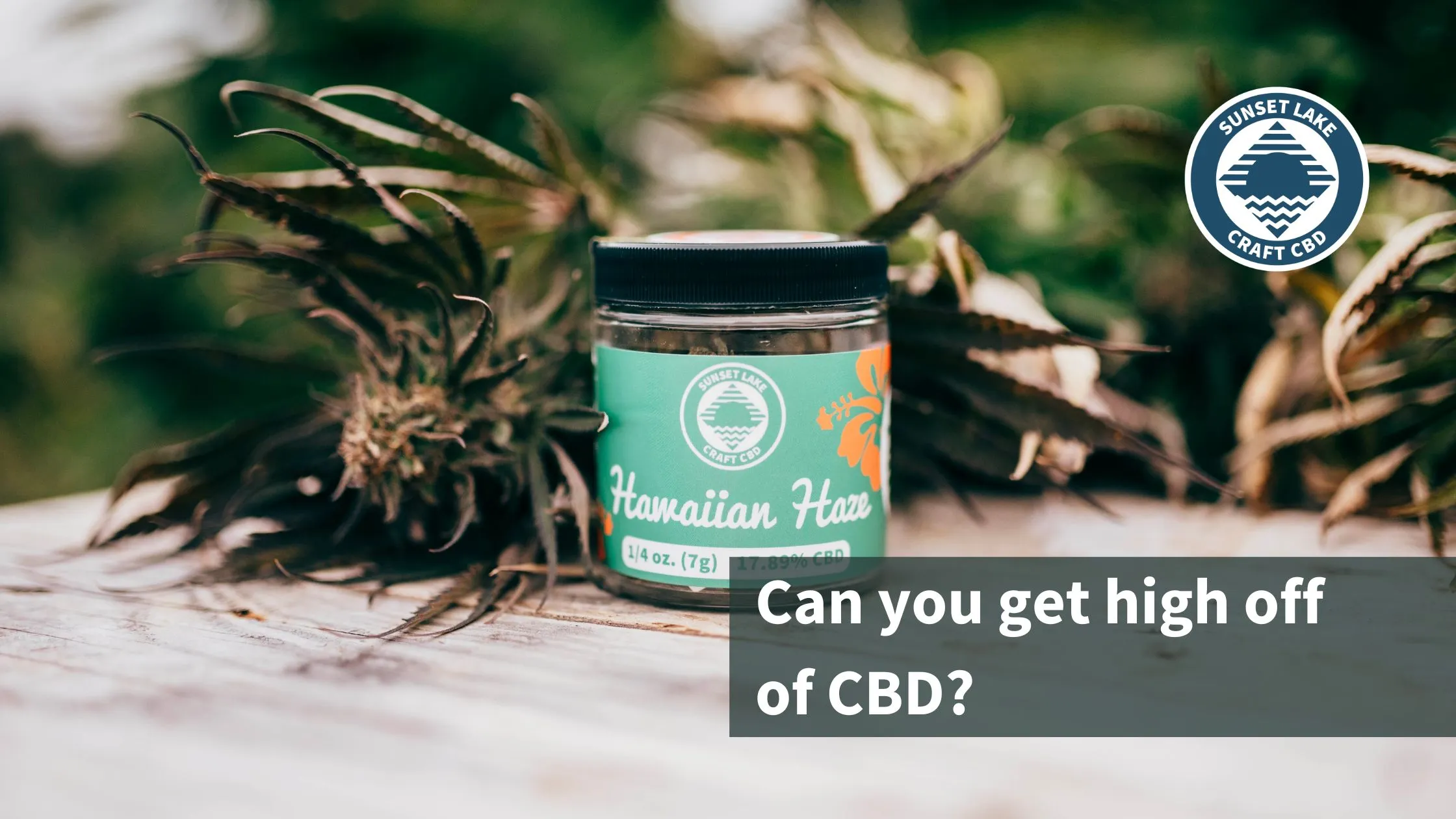No products in the cart.
Can You Get High Off CBD?

CBD, a cannabinoid touted for its relaxation and sleep benefits, is a popular choice among the holistic health community. Unlike THC, another well-known cannabinoid, CBD isn’t psychoactive, but some users report experiencing euphoric feelings. What gives? In this blog post, we’ll explore CBD’s less-discussed side effects and answer the question: Can you get high off CBD?
Key Takeaways
- CBD is different than full-spectrum CBD.
- Full-spectrum CBD products contain trace amounts of THC.
- If you take enough full-spectrum CBD, it’s possible to consume enough THC to feel its intoxicating effects.
Table Of Contents
- What is CBD?
- Does CBD have psychoactive effects?
- What is full-spectrum CBD?
- Can you get high off of CBD?
- Why we make full-spectrum CBD products
What Is CBD?
CBD (cannabidiol) is one of the 100+ cannabinoids produced by mature hemp plants. Cannabis (also known as marijuana) plants also produce CBD, though in smaller concentrations.
While CBD is a relatively new ‘wellness’ product, many use CBD-infused products to help manage,
- Sleep quality and quantity
- Pain in their joints and muscles
- Stresses of all kinds
- And more…
Does CBD Have Psychoactive Properties?
Technically, CBD is psychoactive because it can affect your mood and state of mind. Some clinical trials have found that high doses of CBD can help lower anxiety.1 CBD can also make you sleepy if you use it properly.
According to our looser definition of psychoactive, CBD is not psychoactive in the same way THC is. CBD is not an intoxicating substance because it won’t affect your ability to make decisions or motor control. However, if you consume enough of a full-spectrum CBD product, you can feel intoxicated.
What Is Full-Spectrum CBD?
We need to make an important distinction before we answer the question posed at the beginning of this post. CBD is a cannabinoid with no intoxicating properties itself. When you consume CBD by itself, say in a product made with CBD isolate, you’ll feel fine.
Full-spectrum CBD is a misnomer because instead of referring to CBD, it’s a term for a type of CBD extract. Full-spectrum CBD extract contains the other cannabinoids that hemp plants produce, including trace amounts of THC.
Most modern hemp plants produce CBD and THC in a 25:1 ratio. So, if you see a full-spectrum CBD product, like hemp flower, you can assume that for every 25mg of CBD in it, there will be 1mg of THC.
Can You Get High Off CBD?
No, you can not get high off CBD. The cannabinoid, when consumed by itself, may make you feel more sleepy or relaxed, but it won’t make you feel high or stoned.
However, as we mentioned, if you consume enough of a full-spectrum CBD product, you can get high. The CBD inside is not making you feel high—the trace amounts of THC (and other cannabinoids) are.
Feeling high after using CBD can be affected by additional factors, too.
Edibles vs. Other Consumption Methods
Full-spectrum CBD edibles seem to make users experience more THC effects than other methods. Our best guess is that it has to do with how your liver treats THC that you eat over other ingestion methods.
When THC passes through your gut before it enters your bloodstream, your liver turns it into 11-hydroxy THC, a cannabinoid 6x more potent than regular THC.
Personal Sensitivity
Some of whether or not you feel buzzed from full-spectrum CBD products comes down to personal sensitivity. Some folks will feel even the slightest amount of THC, while others may have effective dose thresholds around 5- or 10mg.
If you’re in the former camp, stick with products manufactured with CBD isolate or broad-spectrum CBD.
Terpenes
The presence of terpenes in your product can alter your experience. While we know these aromatic compounds affect your hemp and cannabis experiences, we don’t know much more than that.
Why Do We Make Full-Spectrum CBD?
If you can get high off of full-spectrum CBD, why is it so prevalent in the hemp industry? Doesn’t that fly in the face of the whole wellness angle?
You would be right that getting high doesn’t necessarily jive with the wellness angle, but there are a few reasons that full-spectrum is so popular.
- Entourage benefits – According to the entourage effect hypothesis, cannabinoids work better together than they do isolated. We’re inclined to buy into this hypothesis based on customer reviews we’ve read. Plus, most published studies that find cannabinoids effective for x,y, or z use full-spectrum products.
- Price of production – Full-spectrum CBD products, on the whole, are more cost-effective than products manufactured with isolates or broad-spectrum CBD. That’s because of the extra costs involved in the extraction and distillation process.
- Some people like the buzz – Finally, people just like the buzz and effects that they achieve with full-spectrum hemp flower and CBD products. Who are we to say it’s a bad thing?
Sources
- Larsen, Christian, and Jorida Shahinas. “Dosage, Efficacy and Safety of Cannabidiol Administration in Adults: A Systematic Review of Human Trials.” Journal of Clinical Medicine Research vol. 12,3 (2020): 129-141. doi:10.14740/jocmr4090

